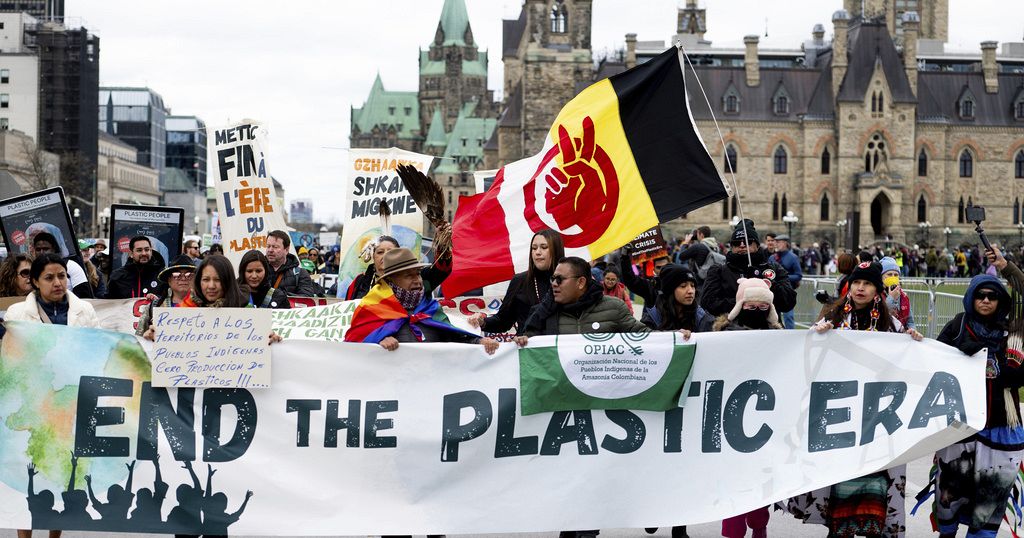World
Plastic pollution: global treaty talks underway in Canadian capital | Africanews

**As the problem of plastic pollution escalates, thousands of delegates representing most of the world’s nations are gathering in Ottawa, Canada, this week for the International Plastics Negotiations. **
Negotiators are aiming to craft a treaty on plastics pollution by the end of this year, following a deadline set by the United Nations.
In March 2022, 175 nations agreed to make the first legally-binding treaty on plastics pollution, including in the oceans, by the end of 2024.
A treaty in the making
Each day, the equivalent of 2,000 garbage trucks full of plastic are dumped into the world’s oceans, rivers and lakes, according to the United Nations Environment Programme. People are increasingly breathing, eating and drinking tiny plastic particles.
Negotiators must streamline the existing treaty draft and decide its scope: whether it will focus on human health and the environment, whether it will limit the actual production of plastic, whether it restrict some chemicals used in plastics.
These are elements that a self-named “high ambition coalition” of countries want to see.
Alternatively, the agreement could have a more limited scope and focus on plastic waste and greater recycling, as some of the plastic-producing and oil and gas exporters want.
It’s an extremely short timeline for negotiations, meant to match the urgency of the problem.
This is the fourth of five meetings of the United Nations’ Intergovernmental Negotiating Committee for Plastics.
Global production and greenhouse gases
Plastic production continues to ramp up globally and is projected to double or triple by 2050 if nothing changes.
Researchers at the federal Lawrence Berkeley National Laboratory published a report last week examining the climate impact.
If production grows conservatively, greenhouse gas emissions emitted from the process would more than double, they concluded.
That could use 21% to 26% of the remaining so-called global carbon budget, which is how much carbon emissions can still be produced between now and 2050 while staying at or below the international goal of limiting warming to 1.5 degrees Celsius (2.7 degrees Fahrenheit) since the 1850s.
Most plastic is made from fossil fuels. Negotiators at the United Nations climate talks known as COP28 agreed last December the world must transition away from planet-warming fossil fuels and triple the use of renewable energy.
But as pressure to reduce fossil fuels has increased, oil and gas companies have been looking more to the plastics side of their business as a lifeboat, a market that could grow.
No consensus yet
The plastics debate concerns a vast array of issues addressing the production, safety and disposal of plastics.
Some measures may be simpler than others for example introducing labelling to help consumers avoid the most damaging plastics, detailed plans for bottle deposits and banning single use plastics.
Other more complex measures could address emissions from places where plastics are made, or stopping fumes emitted by at plants which carry out chemical recycling.
The treaty could also potentially look at banning the most carcinogenic additives used in the production of plastic which affect human and animal health.
It could make companies who create or use plastics responsible for how the products are dealt with at the end of their use to force them to be more responsible for their use by introducing them into the environment.
Biodiversity
The International Union for the Conservation of Nature (IUCN) also has a delegation at the conference.
It’s urging countries debating the treaty to include concerns about the impact of plastics on biodiversity, whether that’s plant or animal species.
The IUCN’s Senior Policy Advisor Dr Karine Siegwart says ignoring the impact of plastics on nature is not an option for any country because every ecosystem is being affected.
“Plastic is everywhere, and it’s in the bodies of human beings and species and ecosystems are very affected,” says Siegwart. “And we have to be aware that biodiversity and ecosystems they are the basis of society and economies. We are depending really on water that we can drink and, ecosystems that are healthy.”
Richard Thompson, Professor of Marine Biology at the University of Plymouth, is among those who believe recycling, chemical or otherwise won’t be enough.
He wants to see a serious reduction in production and a more streamlined production of plastics so only those which can be easily reused or disposed of are produced.
“Clean up is not a centre stage solution,” Thompson says. “We can’t rely on clean up alone, otherwise we simply condemning our children and children’s children to contaminate the environment in the hope that we might just clean it all up later on. We need much more systemic solutions, and that has to start with reduction in the total volumes of plastic we’re producing.”
Fossil fuel lobby
When the treaty talks began in Uruguay in December 2022, factions quickly came into focus. Some countries pressed for global mandates, some for voluntary national solutions and others for both.
Progress was slow during Paris talks in May 2023 and in Nairobi in November.
The United States Senator for Oregon, Jeff Merkley, is also leading a delegation in Ottawa.
He says the meeting will show whether the treaty negotiation will actually achieve anything meaningful or whether oil and fossil fuel producing countries manage to hold sway leaving the world with vague targets and loose timeframes.








